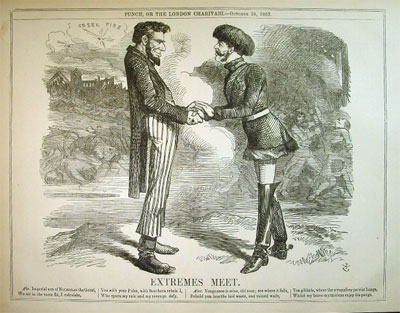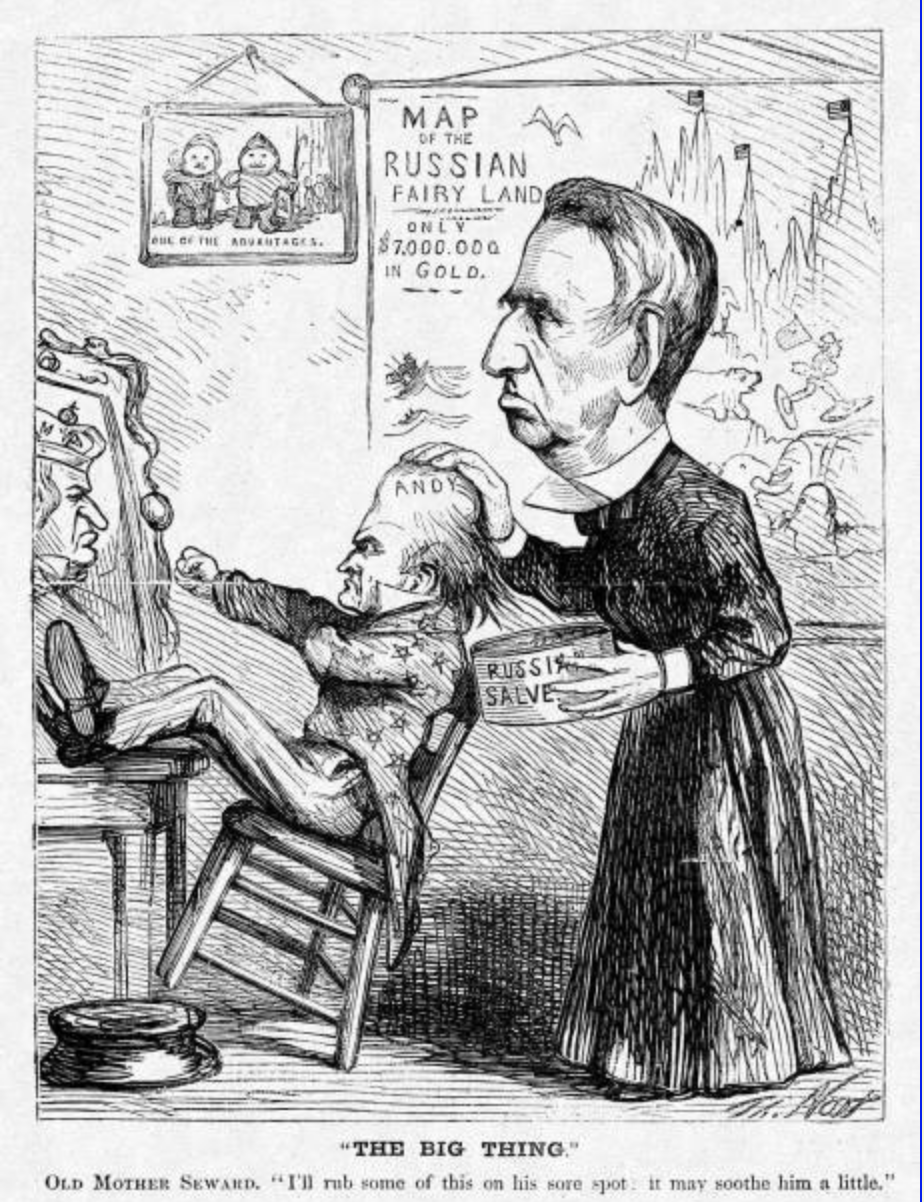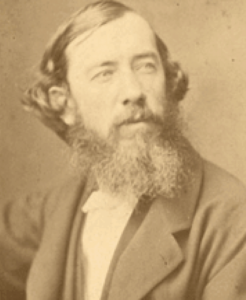Who deserves more credit for the success of US foreign policy during the Civil War: Lincoln or Seward?
CHAPTER 6: “Last Best Hope”: The Union, the Confederacy, and Civil War Diplomacy, 1861-1877
“The Civil War was part of a worldwide mid-nineteenth-century flowering of nation-building, a broader effort on the part of peoples across the globe to affirm, often through force of arms, their national identity. In Europe, Hungarians and Poles rose up in unsuccessful revolts against Austria and Russia. Modern nations took shape in Italy and Germany through military conquest. After a short war, the Swiss formed a federal union binding together cantons previously divided by religion. The Taiping ‘rebellion’ raged for years in China at gruesome cost; the 1868 Meiji Restoration converted Japan from a feudal entity into a modern nation-state. The quest for national identity extended to North America. With indirect U.S. support, Mexicans frustrated France’s attempts to reestablish an American empire. The threat of U.S. annexation during the Civil War forced Britain to shore up Canada’s vulnerability, leading in 1867 to creation of a united nation under a federal constitution with a centralized government.” (Herring, 224-25)
–George C. Herring, From Colony to Superpower: U.S. Foreign Relations Since 1776 (New York: Oxford University Press, 2008), 224-25.
KEY PLAYERS
Abraham Lincoln (1809-1863)
William Henry Seward (1801-1872)
“The architect of Union diplomatic strategy and the individual mainly responsible for its implementation was Secretary of State William Henry Seward. Seward was in many ways a strange person: ‘I am an enigma even to myself,’ he once remarked. A man of enormous energy, sloppy in appearance, he was also a genial host, a lover of fine cigars and brandy, a great raconteur, a person of such magnetism, Henry Adams once said, that he could ‘charm a cow to statesmanship.’ A man of considerable vision and sophistication, he was also earthy and a total political animal. He was brash, impulsive, and hot-tempered, given to bluster and threats. But he was most dangerous, associates said, ‘when he pretends to agree a good deal with you.’” (Herring, chap. 6, p. 227)
Other Key Players, Witnesses, or Examples
- Moncure Conway (Class of 1849)
- Hamilton Fish
For information on Conway’s attempts at wartime diplomacy, see the House Divided YouTube channel
CASE STUDY: Lincoln and Seward
After this inauspicious beginning, Seward matured and went on to conduct Union diplomacy with distinction, maneuvering astutely through a series of crises. –Herring, p. 227
William Seward to Abraham Lincoln, April 1, 1861
Some thoughts for the President’s consideration
April 1. 1861.
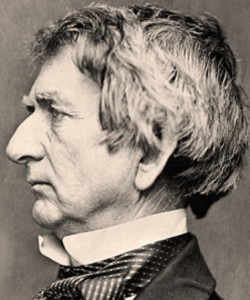 1st. We are at the end of a month’s administration and yet without a policy either domestic or foreign.
1st. We are at the end of a month’s administration and yet without a policy either domestic or foreign.
2d This, however, is not culpable, and it has been unavoidable. The presence of the Senate, with the need to meet applications for patronage have prevented attention to other and more grave matters.
3d. But further delay to adopt and prosecute our policies for both domestic and foreign affairs would not only bring scandal on the Administration, but danger upon the country….
…The policy—at home. I am aware that my views are singular, and perhaps not sufficiently explained. My system is built upon this idea as a ruling one, namely that we must Change the question before the Public from one upon Slavery, or about Slavery for a question upon Union or Disunion. In other words, from what would be regarded as a Party question to one of Patriotism or Union…
For Foreign Nations.
I would demand explanations from Spain and France, categorically, at once [regarding the occupation of Santo Domingo]. I would seek explanations from Great Britain and Russia, and send agents into Canada, Mexico and Central America, to rouse a vigorous continental spirit of independence on this continent against European intervention. And if satisfactory explanations are not received from Spain and France,
–Would convene Congress and declare war against them
But whatever policy we adopt, there must be an energetic prosecution of it. For this purpose it must be somebody’s business to pursue and direct it incessantly. Either the President must do it himself, and be all the while active in it; or Devolve it on some member of his Cabinet. Once adopted, debates on it must end, and all agree and abide. It is not in my especial province. But I neither seek to evade nor assume responsibility.
Lincoln’s reply to Seward (read aloud on April 2, 1861)
Executive Mansion
April 1, 1861
Hon. W. H. Seward
My dear Sir:
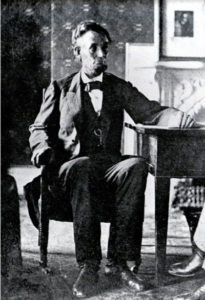 Since parting with you I have been considering your paper dated this day, and entitled “Some thoughts for the President’s consideration.” The first proposition in it is, “1st. We are at the end of a month’s administration, and yet without a policy, either domestic or foreign.”
Since parting with you I have been considering your paper dated this day, and entitled “Some thoughts for the President’s consideration.” The first proposition in it is, “1st. We are at the end of a month’s administration, and yet without a policy, either domestic or foreign.”
At the beginning of that month, in the inaugeral, I said “The power confided to me will be used to hold, occupy and possess the property and places belonging to the government, and to collect the duties, and imposts.” This had your distinct approval at the time; and, taken in connection with the order I immediately gave General Scott, directing him to employ every means in his power to strengthen and hold the forts, comprises the exact domestic policy you now urge, with the single exception, that it does not propose to abandon Fort Sumpter.
Again, I do not perceive how the re-inforcement of Fort Sumpter would be done on a slavery, or party issue, while that of Fort Pickens would be on a more national, and patriotic one.
The news received yesterday in regard to St. Domingo, certainly brings a new item within the range of our foreign policy; but up to that time we have been preparing circulars, and instructions to ministers, and the like, all in perfect harmony, without even a suggestion that we had no foreign policy.
Upon your closing propositions, that “whatever policy we adopt, there must be an energetic prossecution of it. For this purpose it must be somebody’s business to pursue and direct it incessantly. Either the President must do it himself, and be all the while active in it, or Devolve it on some member of his cabinet. Once adopted, debates on it must end, and all agree and abide.”
I remark that if this must be done, I must do it. When a general line of policy is adopted, I apprehend there is no danger of its being changed without good reason, or continuing to be a subject of unnecessary debate; still, upon points arising in its progress, I wish, and suppose I am entitled to have the advice of all the cabinet.
Your Obt. Servt.
A. LINCOLN
KEY TERMS: Trent Affair (1861) // Seward’s Folly (1867)
Trent Affair (1861)
“This changed suddenly in November 1861 when an incident at sea brought the United States and Britain to the verge of war. The Trent affair was the handiwork of the brilliant and eccentric Capt. Charles Wilkes. An accomplished scientist as well as naval officer, Wilkes headed the Great United States Exploring Expedition on its worldwide journey in the 1840s. Arrogant, overbearing, as paranoid as the legendary Capt. William Bligh, he was also impulsive and ambitious –once he promoted himself to captain while at sea and ostentatiously donned the uniform he had packed away for the occasion. His actions in 1861 made clear the way an impetuous individual could provoke a major crisis.” –Herring, From Colony to Superpower, p. 232
Discussion Questions
- How exactly did this “impetuous and ambitious” individual (Charles Wilkes) provoke “a major crisis”?
- Which individuals deserve most credit for deescalating this crisis between the US and Great Britain?
Student-created map by Emilia McManus (Fall 2014)
Seward’s Folly (1867)
“Scorned by many at the time, the purchase [of Alaska] became Seward’s greatest triumph. Eager for something to offset the administration’s domestic failures, he jumped at the chance to purchase Alaska. The price of $7.2 million was $2 million more than he wanted to pay and $2 million more than the Russians originally sought, but the secretary was in a hurry to consummate the deal; he and Russian minister Eduard Stoeckl worked until 4:00 AM to draw up a treaty. Critics dismissed Alaska as a ‘sucked orange,’ ‘Seward’s Folly,’ or Johnson’s ‘polar bear garden.’ Editor Horace Greeley called it ‘Walrussia.’ Foes of the purchase accused Johnson and Seward of trying to deflect attention from failures at home. Seward lobbied furiously and effectively, however, emphasizing the land’s commercial and strategic potential and the importance of obliging good friends like the Russians. Congress was in full revolt against Johnson by this time, and the House of Representatives out of pique threatened not to appropriate funds. While complaining about the ‘wholly exceptional’ difficulties of conducting diplomacy in the American democratic system, Stoeckl, who stood to profit handsomely from the deal, bribed key congressmen. At the time of the purchase, the main product of ‘Seward’s ice box’ was indeed ice, sold in large quantities to the bustling communities along the West Coast. More quickly than anyone might have imagined, the secretary’s vision was vindicated, his prize acquisition, like California earlier, bringing the added bonus of gold.” –Herring, From Colony to Superpower, p. 258
Discussion Questions
- Herring’s summary of the value underlying the Alaskan purchase requires a good deal of background or context knowledge about US-Russian relations and American domestic politics in the Reconstruction era. What are some of the key contextual factors that made “Seward’s Folly” possible in 1867?
- Herring calls the Alaskan purchase as William Henry Seward’s “greatest triumph” as US secretary of state. Earlier in the chapter, he also suggested that “Seward now ranks among the nation’s best secretaries of state” (228). What do consider to be Seward’s most impressive accomplishments and traits as a diplomat, or do you find yourself unpersuaded by Herring’s high praise?

